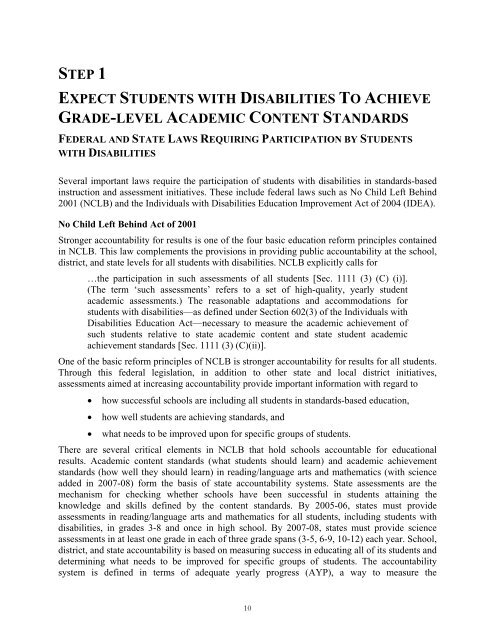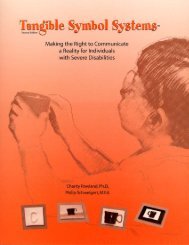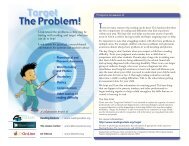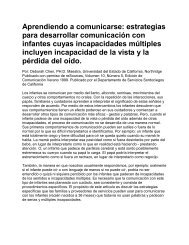ACCOMMODATIONS MANUAL - The Office of Special Education ...
ACCOMMODATIONS MANUAL - The Office of Special Education ...
ACCOMMODATIONS MANUAL - The Office of Special Education ...
Create successful ePaper yourself
Turn your PDF publications into a flip-book with our unique Google optimized e-Paper software.
STEP 1<br />
EXPECT STUDENTS WITH DISABILITIES TO ACHIEVE<br />
GRADE-LEVEL ACADEMIC CONTENT STANDARDS<br />
FEDERAL AND STATE LAWS REQUIRING PARTICIPATION BY STUDENTS<br />
WITH DISABILITIES<br />
Several important laws require the participation <strong>of</strong> students with disabilities in standards-based<br />
instruction and assessment initiatives. <strong>The</strong>se include federal laws such as No Child Left Behind<br />
2001 (NCLB) and the Individuals with Disabilities <strong>Education</strong> Improvement Act <strong>of</strong> 2004 (IDEA).<br />
No Child Left Behind Act <strong>of</strong> 2001<br />
Stronger accountability for results is one <strong>of</strong> the four basic education reform principles contained<br />
in NCLB. This law complements the provisions in providing public accountability at the school,<br />
district, and state levels for all students with disabilities. NCLB explicitly calls for<br />
…the participation in such assessments <strong>of</strong> all students [Sec. 1111 (3) (C) (i)].<br />
(<strong>The</strong> term ‘such assessments’ refers to a set <strong>of</strong> high-quality, yearly student<br />
academic assessments.) <strong>The</strong> reasonable adaptations and accommodations for<br />
students with disabilities—as defined under Section 602(3) <strong>of</strong> the Individuals with<br />
Disabilities <strong>Education</strong> Act—necessary to measure the academic achievement <strong>of</strong><br />
such students relative to state academic content and state student academic<br />
achievement standards [Sec. 1111 (3) (C)(ii)].<br />
One <strong>of</strong> the basic reform principles <strong>of</strong> NCLB is stronger accountability for results for all students.<br />
Through this federal legislation, in addition to other state and local district initiatives,<br />
assessments aimed at increasing accountability provide important information with regard to<br />
• how successful schools are including all students in standards-based education,<br />
• how well students are achieving standards, and<br />
• what needs to be improved upon for specific groups <strong>of</strong> students.<br />
<strong>The</strong>re are several critical elements in NCLB that hold schools accountable for educational<br />
results. Academic content standards (what students should learn) and academic achievement<br />
standards (how well they should learn) in reading/language arts and mathematics (with science<br />
added in 2007-08) form the basis <strong>of</strong> state accountability systems. State assessments are the<br />
mechanism for checking whether schools have been successful in students attaining the<br />
knowledge and skills defined by the content standards. By 2005-06, states must provide<br />
assessments in reading/language arts and mathematics for all students, including students with<br />
disabilities, in grades 3-8 and once in high school. By 2007-08, states must provide science<br />
assessments in at least one grade in each <strong>of</strong> three grade spans (3-5, 6-9, 10-12) each year. School,<br />
district, and state accountability is based on measuring success in educating all <strong>of</strong> its students and<br />
determining what needs to be improved for specific groups <strong>of</strong> students. <strong>The</strong> accountability<br />
system is defined in terms <strong>of</strong> adequate yearly progress (AYP), a way to measure the<br />
10





